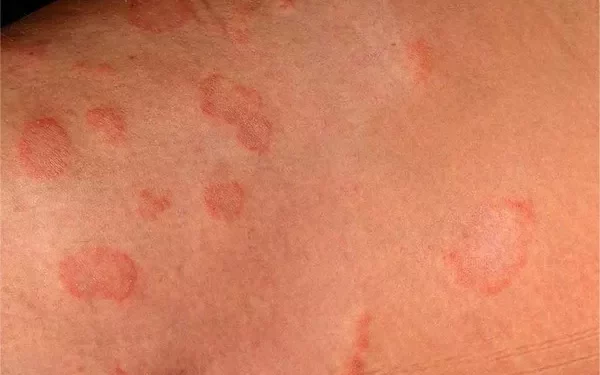Ringworm is a common fungal infection that can affect various parts of the body. Despite its name, it is not caused by a worm but by a type of fungus. This article will explore how long it typically takes for ringworm to go away with treatment, the types of treatments available, and tips for prevention and care.
What is Ringworm?
Ringworm, medically known as tinea, is a skin infection caused by dermatophytes, a type of fungus. It can appear on different areas of the body, including:
- Scalp (tinea capitis)
- Body (tinea corporis)
- Feet (tinea pedis, also known as athlete’s foot)
- Nails (tinea unguium)
Symptoms of Ringworm
Ringworm can be identified by several common symptoms:
- Red, itchy patches on the skin
- Raised, scaly borders that may resemble a ring
- Bald patches on the scalp
- Thickened or discolored nails if nails are affected
How is Ringworm Diagnosed?
A healthcare professional can diagnose ringworm based on a physical examination. They may also take a sample of skin or nail tissue to confirm the presence of fungus through laboratory tests.
Treatment Options for Ringworm
Treating ringworm is essential for effective recovery. Here are the common treatment options:
1. Topical Antifungal Medications
These are the first-line treatments for most cases of ringworm. Over-the-counter options include:
- Clotrimazole
- Miconazole
- Terbinafine
Prescription options are also available, including:
- Ketoconazole
- Econazole
How to Use Topical Treatments
- Clean the affected area before application.
- Apply a thin layer of the medication to the affected area and surrounding skin.
- Continue treatment for the full recommended duration, even if symptoms improve.
2. Oral Antifungal Medications
For more severe cases or when ringworm affects the scalp or nails, oral antifungal medications may be prescribed. Common options include:
- Griseofulvin
- Terbinafine
- Itraconazole
These medications are usually taken for several weeks, depending on the severity and location of the infection.
3. Home Remedies
While not a substitute for medical treatment, some people find relief from home remedies. These include:
Tea tree oil: Known for its antifungal properties.
Apple cider vinegar: May help reduce itching and irritation.
However, it is essential to consult a healthcare professional before using any home remedy.
How Long Does Ringworm Take to Go Away with Treatment?
The duration for ringworm to resolve varies based on several factors, including the type of treatment used, the location of the infection, and the individual’s immune response.
1. Typical Duration
Topical Treatments: Most people see improvement within 2 to 4 weeks of consistent use. Full resolution can take up to 6 weeks.
Oral Medications: These may take 4 to 12 weeks to clear the infection, especially for nail and scalp infections.
2. Factors Affecting Healing Time
Several factors can influence how long ringworm takes to go away:
Location of the infection: Ringworm on the scalp or nails usually takes longer to treat than ringworm on the skin.
Severity of the infection: More extensive infections may require more time to heal.
Immune System Health: Individuals with compromised immune systems may experience prolonged symptoms.
Importance of Completing Treatment
Even if symptoms improve, it is crucial to complete the entire course of treatment. Stopping early can lead to:
- Recurrence of the infection
- Development of antifungal resistance
Signs of Improvement
Patients should watch for signs that treatment is working:
- Reduced redness and swelling
- Decreased itching
- Resolution of flaky skin
If symptoms do not improve after the expected duration of treatment, it is vital to consult a healthcare professional.
Preventing Ringworm
Preventing ringworm can significantly reduce the risk of infection. Here are some tips:
1. Practice Good Hygiene
- Wash hands regularly, especially after touching pets or other people.
- Keep skin clean and dry. Fungi thrive in warm, moist environments.
2. Avoid Sharing Personal Items
- Do not share towels, clothing, or grooming tools.
- Use your own sports equipment.
3. Wear Appropriate Footwear
- Use sandals in communal showers or locker rooms.
- Choose breathable shoes to minimize moisture.
4. Treat Infected Pets
Ringworm can be transmitted from pets to humans. If a pet shows signs of ringworm, consult a veterinarian for treatment.
When to See a Doctor
Consult a healthcare professional if:
- Symptoms worsen or do not improve after a few weeks of treatment.
- The infection spreads to other areas.
- You experience severe itching or pain.
Conclusion
Ringworm is a common fungal infection that can often be effectively treated with topical or oral antifungal medications. Most cases improve within a few weeks, but complete recovery may take longer for more severe infections. By practicing good hygiene and taking preventive measures, you can significantly reduce your risk of contracting ringworm. If you suspect you have ringworm, seek medical advice for appropriate treatment options. Remember, completing the full course of treatment is vital for a complete recovery.
Related topics:
- Does Ringworm Come Back After Treatment?
- Best Medicine for Ringworm on Face
- How Fast Does Ringworm Go Away with Treatment?

























